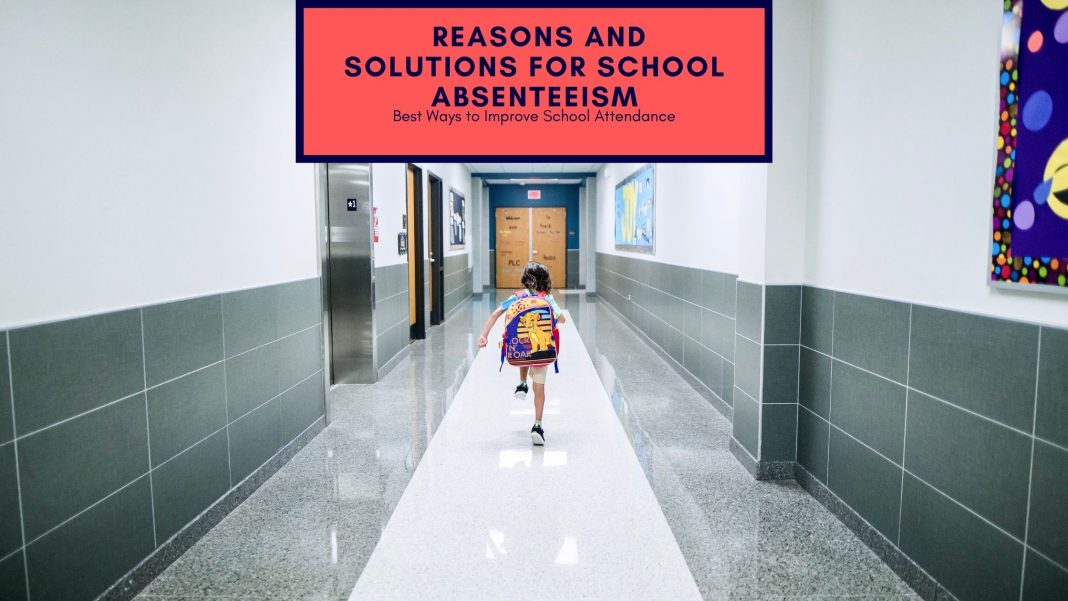Parents try their best to keep their children in school as much as possible, however, the Coronavirus pandemic has shown, according to statistics published by the UK government, that school attendance in state-funded schools in September was between 89-90% until October half term, where attendance then fell to 83% on 19 November.
Therefore, absenteeism is one of the problems that bother most parents and schools, especially in these challenging times.
Chronic absenteeism is on the rise and a few studies have led to the following results: Children who miss their classes will score lower in math and English skills and will have lower educational gain.
If the problem of absenteeism is not solved, it will prevent students from acquiring essential knowledge that will help them in their future careers such as academic writing at university.
Moreover, attending classes and going to school is not only about gaining information. It is also about developing soft and social skills, learning how to communicate and interact with other people.
If you are a concerned parent or teacher, you can check these 7 ways to tackle student absenteeism:
1. Improve Access to Technology
Now with the global pandemic under way, classes have shifted online. Students take part in online classes from the comfort of their own home, which may make the entire learning process too familiar. Absenteeism is on the rise, especially during online education.
However, some students miss the classes because they do not have the technology and digital devices necessary to take part. Providing them with the tools and access needed for education is essential and it can reduce student absenteeism. The UK government has launched grants and schemes to support disadvantaged families gaining better internet access from home and digital devices for their children to access remote learning provided by their schools. You can find more information about how to apply here: Get help with technology during coronavirus (COVID-19) – GOV.UK (www.gov.uk)
2. Highlight the Power of Mentors
Many students feel overwhelmed by school life and they do not know how to deal with the challenges that come with it. They will let themselves be defeated by these challenges if they do not know how to overcome them. This results in high rates of absenteeism and the students missing important lectures.
Students need to know that they can choose a mentor, from their teachers or family. They can even choose a colleague as a mentor that will support them when they will have tough moments. Mentors can boost the motivation and productivity of students and help them take part in classes. And if students require support in a particular subject, online tutoring services can help as well.
3. Healthy Habits
Some habits might hinder students’ motivation and will to learn and improve. These habits include having breakfast, drinking enough water, and reducing the time spent on social media.
Healthy habit adoption should be encouraged by parents and teachers alike. Most of the time, students do not realize that what they are doing is toxic. They need to understand that simple things such as having breakfast in the morning or exercising regularly can supply them with the energy they need during classes.
4. Extracurricular Learning
Most students have high rates of absenteeism because they are not interested in the information presented. While some information might be seen as useless, its benefits for the improvement of critical thinking skills cannot be overlooked.
Students that are encouraged to get involved in extracurricular activities such as going to art classes can change the entire perspective they have on learning. Photography, reading, or blogging can be some of the hobbies students can have to further their learning and nurture more skills.
Learn more about how blogging can be a fantastic extracurricular activity and its benefits on the eLearning Industry blog.
5. Early Intervention
One of the most efficient ways to tackle student absenteeism is to intervene early. This means that the school team or local authority will contact parents when students have missed more than their annual allowance without a good reason for their absence, e.g. health, and you can learn more about the legal legal action to enforce school attendance here: School attendance and absence: Legal action to enforce school attendance – GOV.UK (www.gov.uk).
This allows all actors involved to intervene and reduce absenteeism. In extreme cases, parents will be required to show proof of reasons for their child’s absence and meet with headteachers, safeguarding leads and local community officers to avoid fines.
6. Communication
Communication is important and essential every step of the way and parents that have children with chronic absenteeism can begin by talking with them. Understanding what they go through, which is their perspective on education and school, and why they miss school is important. Parents can share the benefits of going to school, meeting with colleagues, and learning new interesting things and they can also intervene should bullying or any other negative experience prevent their child from attending school.
Communication should also come from teachers. Collecting feedback from the students to improve their learning and teaching methods can indeed reduce student absenteeism. Most schools provide pastoral care where a designated lead will offer support to the child and the family.
7. Positive Culture
Students often have high rates of absenteeism when something from school bothers them. They might not feel safe or they might not feel empowered. It is thus important for parents and teachers to work on this issue.
Creating a positive school culture where students feel valued and safe will lead to lower rates of absenteeism. And low rates of absenteeism lead to higher grades and more involvement and motivation for students.
Conclusion
How to tackle absenteeism is a topic of interest for parents, teachers and students. Students might miss classes for various reasons. It is important to understand what triggers absenteeism and intervene early.
Another essential ingredient is communication and the pursuit of hobbies, which give students a positive perspective on learning. It may be a challenging thing to do, but it is for the student’s good.
Author Profile

- Administrative Assistant at EduIntello
- Jessica Chapman is a writing editor from Chicago working at a top essay writing and with eduintello.com. She is into sport and politics, enjoys traveling.
Latest entries
 distance learningDecember 22, 20208 Most Pressing Challenges in Education Arising from the COVID-19 Pandemic
distance learningDecember 22, 20208 Most Pressing Challenges in Education Arising from the COVID-19 Pandemic learningDecember 21, 20207 Ways to Tackle Student Absenteeism
learningDecember 21, 20207 Ways to Tackle Student Absenteeism educationNovember 3, 2020Which Countries Offer the Best Education in the World?
educationNovember 3, 2020Which Countries Offer the Best Education in the World?







